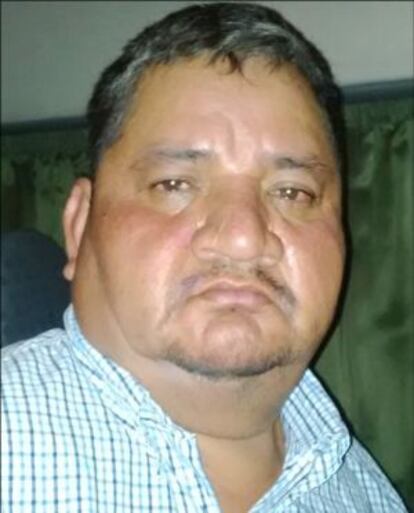Mexico captures ruthless Gulf Cartel leader in border town
José Sánchez García was wanted for the murders of two law enforcement officers


One of the most violent leaders of Mexico’s notorious Gulf Cartel was captured in the northern border city of Matamoros on Thursday, authorities said.
José Sánchez García was the cartel’s chief in three municipalities in Tamaulipas state, which shares the border with Texas. He was wanted for the murder of two police officers and for kidnapping employees of the Attorney General’s Office.
“At one time he controlled seven different groups of hit men, who were known for their use of extreme violence,” said Monte Alejandro Rubido, Mexico’s National Security Chief, on Sunday.
Sánchez García was also wanted for extorting local businessmen out of as much as $40,500.
As authorities closed in, they were met with gunfire and grenades from Sánchez Garcia’s gang, whose members were guarding his hideout in Matamoros. At the time of his apprehension, the cartel leader was carrying a Barret M82 – a rifle used by the US military.
The 47-year-old’s violent nature was so well-known that in 2010 another Gulf Cartel leader, Mario Armando Ramírez Treviño, invited him to join the drug trafficking organization.
Five years later, authorities had linked Sánchez García to a string of crimes including the murders of a federal police officer in September 2014 and the government’s chief security delegate in the town of Aldama a month earlier.
Law enforcement officials also said he was the mastermind behind the ambush and kidnappings of two Attorney General’s Office workers who were investigating him.
Sánchez García is the latest high-profile trafficker to have buckled under President Enrique Peña Nieto’s national offensive aimed at busting up Mexico’s cartels.
The deployment of troops has only had marginal success in fragmenting drug organizations
In February, authorities arrested Omar Treviño, the leader of the Zetas, in Monterrey, Nuevo León state. A week before Treviño’s bust, authorities captured Servando La Tuta Gómez, the leader of the Knights Templar cartel in Michoacán.
But it was in February 2014 that Mexico dealt its most significant blow to drug trafficking when marines captured Joaquín El Chapo Guzmán, the head of the Sinaloa Cartel and a wanted fugitive in both his own country and the United States.
Peña Nieto’s drug offensive is concentrated in Mexico’s northern regions in an effort to break up the Zeta and the Gulf cartels, which have been intensifying their drug activities over the past several years.
Last May, the government ordered troops to Tamaulipas and divided the state into four different security quadrants, each with their own military command. But the deployment of soldiers, marines and federal police contingents has had only marginal success in fragmenting drug organizations.
Interior chief Osorio Chong acknowledged that violence has also soared following the government’s actions
As soon as the captures of different drug leaders in Tamaulipas and Nuevo León are announced, a new chief quickly takes over.
Interior Minister Miguel Ángel Osorio Chong acknowledged in February that violence has also soared in these two states following the government’s deployments.
Last year, there was an increase in violent murders and petty crime while traffickers continued to use different methods to terrorize residents and scare them out of giving information to authorities.
Even Televisa, Mexico’s largest broadcaster, has been the target of two attacks this year. The most recent one occurred on March 26, when a group of hit men broke through police security and threw a grenade at one of its local facilities in Tamaulipas.
Other media have also suffered. On February 6, several employees of El Mañana de Matamoros resigned after the daily’s editor was kidnapped.
Tu suscripción se está usando en otro dispositivo
¿Quieres añadir otro usuario a tu suscripción?
Si continúas leyendo en este dispositivo, no se podrá leer en el otro.
FlechaTu suscripción se está usando en otro dispositivo y solo puedes acceder a EL PAÍS desde un dispositivo a la vez.
Si quieres compartir tu cuenta, cambia tu suscripción a la modalidad Premium, así podrás añadir otro usuario. Cada uno accederá con su propia cuenta de email, lo que os permitirá personalizar vuestra experiencia en EL PAÍS.
¿Tienes una suscripción de empresa? Accede aquí para contratar más cuentas.
En el caso de no saber quién está usando tu cuenta, te recomendamos cambiar tu contraseña aquí.
Si decides continuar compartiendo tu cuenta, este mensaje se mostrará en tu dispositivo y en el de la otra persona que está usando tu cuenta de forma indefinida, afectando a tu experiencia de lectura. Puedes consultar aquí los términos y condiciones de la suscripción digital.








































